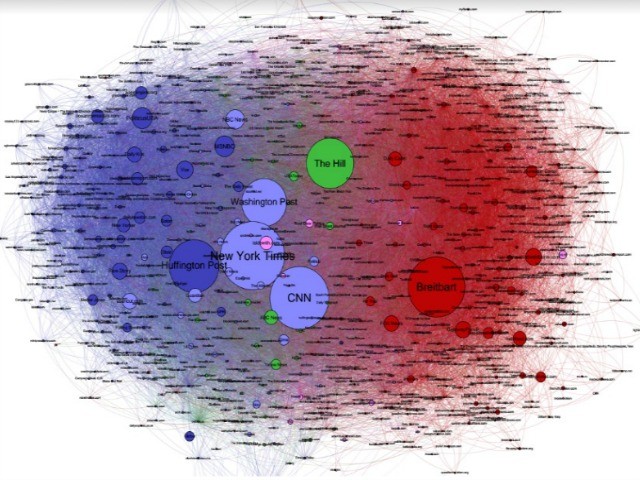NBC and MSNBC contributor John Heilemann told Chris Matthews on Monday that Breitbart News is more powerful and influential than Fox News when it comes to influencing elections.
“Breitbart is a more powerful media institution and a more powerful media institution on the right than Fox News,” he said on Hardball.
Heilemann added that “for the last 20 years, if Fox News decided to get behind a candidate, that was trouble for the incumbent.” But that is not the case today because, according to Heilemann, “if Steve Bannon decides to train all of Breitbart’s fire on an incumbent Republican … you’re going to have a vulnerable incumbent.”
Matthews and his panel were discussing a Politico report that indicated Bannon is planning to back challengers to establishment Republican Sens. Dean Heller (R-NV), Bob Corker (R-TN), Roger Wicker (R-MS), and Jeff Flake (R-AZ) in addition to Luther Strange (R-AL).
Conservative talk radio icon Rush Limbaugh has pointed out that though those in the legacy media still think of Fox News as a conservative network, viewers in the Heartland do not think so. Many right-of-center viewers watch Fox News because it is quite simply the least offensive alternative they have, and Limbaugh once said on his radio show that it was “quite telling” that Fox News executives would not let him criticize the comprehensive amnesty legislation that Fox News and the “Gang of Eight” backed after the 2012 election.
Breitbart News and Fox News were on opposites sides of the two most important battles after the 2012 election–amnesty for illegal immigrants and Donald Trump. And working-class Americans sided with Breitbart News each time. As Devil’s Bargain author Joshua Green pointed out, Sen. Marco Rubio (R-FL), the face of the Gang of Eight, was the darling of Fox News, and that is why pro-amnesty advocates believed Republicans could get a comprehensive amnesty bill passed in Congress:
Rupert Murdoch, the CEO of News Corp., which owned Fox, and Roger Ailes, the network’s president, were both strong advocates of immigration reform, and made sure the network reflected their preferences. “God bless Fox,” gushed South Carolina Senator Lindsey Graham.
Breitbart News adopted Nolan Richardson’s “40 minutes of hell” strategy to oppose the establishment and their coveted amnesty bill. As I noted, “Breitbart News was undersized, outmanned, and taking on the ‘professional conservative’ establishment, the GOP establishment, the establishment media and their liberal allies, the international establishment, and the left. All too often, all five of these camps tried to swarm Breitbart News. But Breitbart News prevailed and got even stronger because, like the honey badger, Bannon and Breitbart News didn’t give a sh*t” about what the political and media establishments thought and only cared about the concerns of working-class Americans of all backgrounds.
And in 2016, Fox News tried to undercut Donald Trump every step of the way during the primary season—favoring candidates like former Florida Governor Jeb! Bush and Rubio. And the network faced immediate backlash when former anchor Megyn Kelly, whose show Fox News viewers just left on, as the joke goes, while they did laundry, dishes, and other chores after Bill O’Reilly and before Sean Hannity, tried to kneecap frontrunner Trump in the first GOP primary debate. New York magazine’s Gabriel Sherman “pointed out that Ailes was livid that nearly all of the emails took Trump’s side” after Trump clashed with Kelly, as Breitbart News noted.
Even though Trump won the White House, Murdoch’s sons reportedly want to turn Fox News into a CNN-lite network and move the channel further away from working-class Americans–some of whom are Democrats or unaffiliated–who support economic nationalism. Michael Wolff wrote in the Hollywood Reporter that Murdoch’s sons reportedly think Fox News will be more successful by appealing to the “3.8%“:
There were two different Americas located in different worlds and different times, ever-more unrecognizable to each other — that was [Roger] Ailes’ political and business insight, which Trump has now carried to a stunning conclusion. Ironically for Ailes, Murdoch senior had built his fortune cultivating one of those worlds — presciently using Ailes’ talents to cultivate it — but his aspirational sons now saw their future in the other. As Ailes was ousted, and as Trump was elected on an explicitly nationalist platform, the Murdoch brothers were pursuing their global dream of taking full ownership of Sky, the British satellite entertainment service, and creating a global television and news company.
In a recent New York Times magazine cover story about Breitbart News, Wil Hylton wrote that there is “no real precursor for Breitbart” of a news outlet that has so quickly emerged to “dominate the political conversation in a pivotal election” like Breitbart News did in 2016. Harvard Law Professor Yochai Benkler, who led a Harvard/MIT team that extensively studied the media ecosystem, found that Breitbart News had three times as much influence as Fox News on the right:
Benkler, the Harvard professor, told the Times that he inadvertently started to study Breitbart News because of the influence the outlet was having among voters who felt that establishment politicians and media outlets across the spectrum were out of touch with their concerns. And unlike legacy media outlets who do their best to conceal their left-wing activism under the false pretense of “objectivity,” Breitbart News resonated and gained credibility with so many Americans because Breitbart News has always been honest and transparent about where it has stood on issues like illegal immigration, radical Islamic terrorism, and policies that benefit American workers.
‘‘We didn’t set out to study Breitbart,’’ Benkler said. ‘‘Breitbart came from the data, not the other way around.’’
During the 2016 election, Benkler’s “team developed a method to determine the political association of any website’s audience,” with blue dots representing liberal readership and red dots representing conservative readership.
“Looking at the blue parts of the image, nothing was surprising: The largest circles were CNN and The New York Times, each shaded pale blue to indicate a center-left association. But the other side of the image showed just one big red circle: Breitbart,” Hylton writes in the Times magazine essay. “It was three times the size of Fox News and maybe a dozen times larger than any other news source on the right. If you wanted to know who was driving the Republican agenda in 2016, you didn’t need to look much farther than the massive crimson orb parked on Benkler’s screen.”


COMMENTS
Please let us know if you're having issues with commenting.